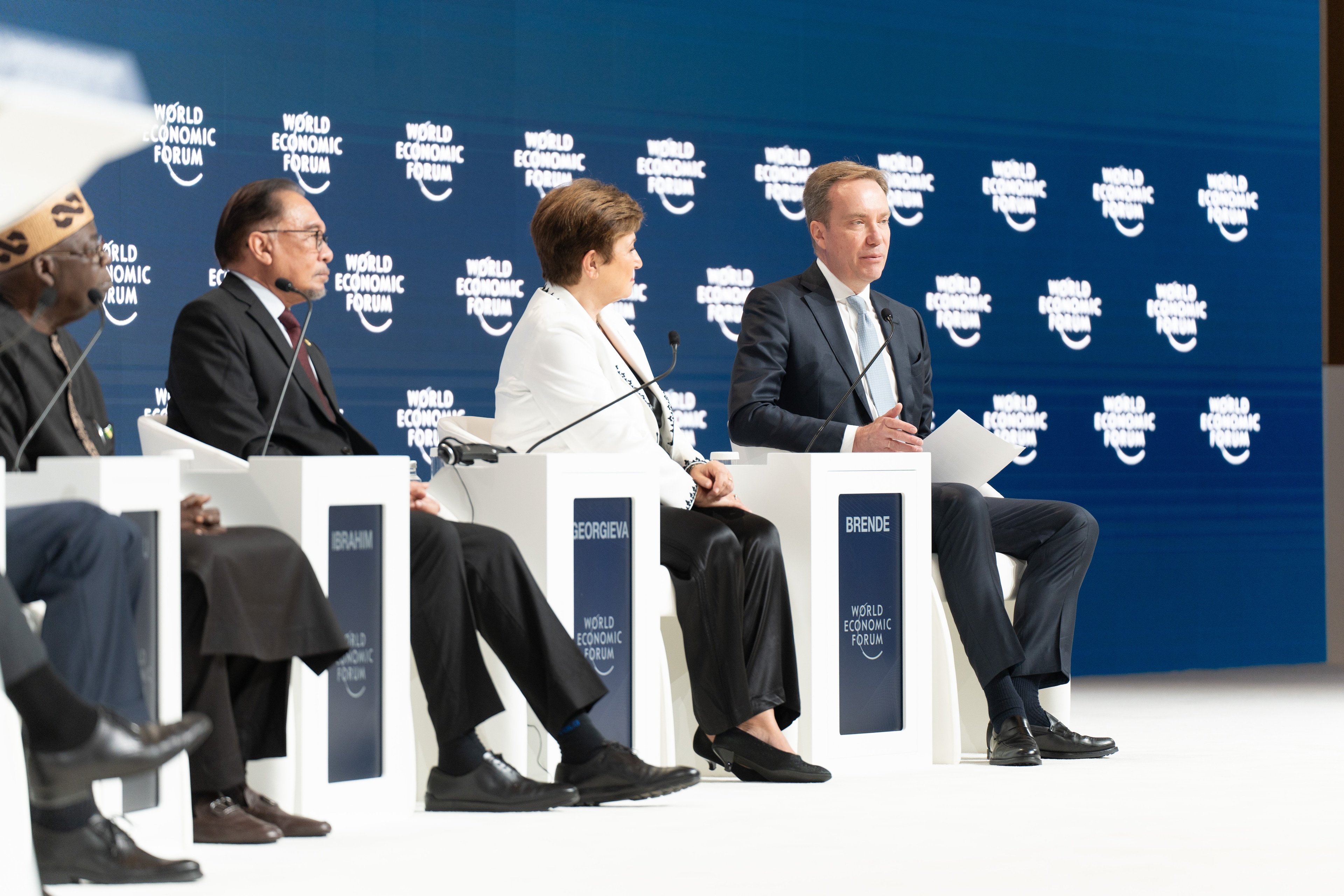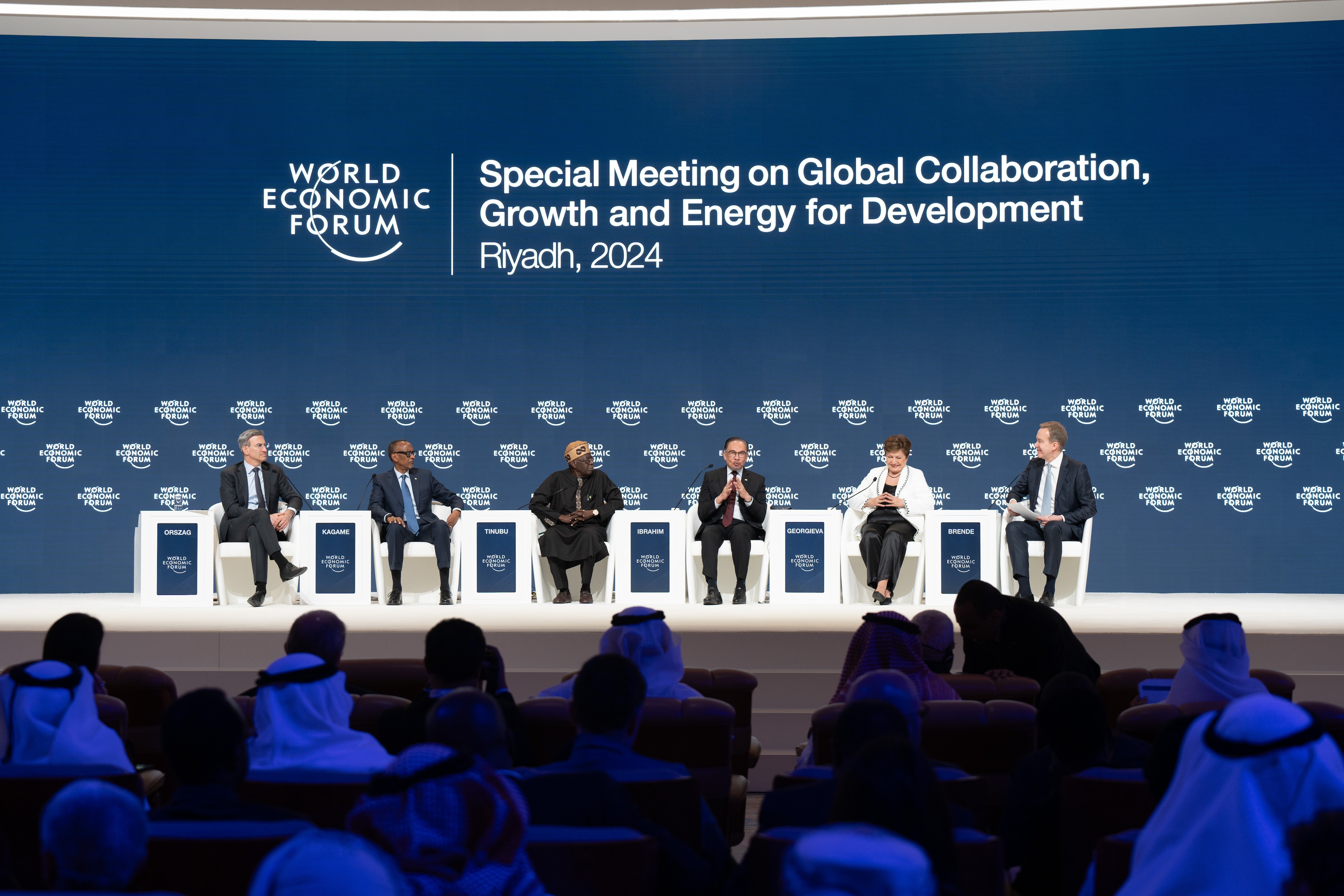Having a baby during COVID-19 gave me new respect for the job ‘mom’

"Motherhood is a joy, and motherhood is work." Image: REUTERS/Brian C. Frank

Get involved with our crowdsourced digital platform to deliver impact at scale
Stay up to date:
Davos Agenda
- Mothers have been among the hardest hit by the effects of the COVID-19 pandemic.
- Women lost almost twice as many jobs around the world as men, largely as a result of caregiving demands.
- We must do more to protect and empower mothers to strengthen our economies and societies.
I had a baby during the pandemic and everything changed.
I suppose I knew it would. I was, after all, creating new life. I was also taking on a new, unpaid, full-time job - mom - and all the other roles that came with my new life as a caretaker.
What I didn’t count on was COVID-19, and the lockdowns and the isolation and that extra layer of uncertainty and anxiety that has blanketed the globe in the past year. I now have a deeper appreciation for all the moms who laboured in a mask or breastfed on Zoom calls or tackled virtual school or came up with yet another quarantine-approved activity.
Because in the past 12 months of late-night cuddles and countless diaper changes, two things quickly became clear: Motherhood is a joy, and motherhood is work.
And that’s in normal times. The pandemic has heightened many of the challenges that mothers around the world face as the global health threat and resulting economic downturn have created a caregiving crisis that has disproportionately affected women.
This year, Mother’s Day brings with it a harsh reality: As a society, we may celebrate motherhood, but we don’t value it.
The cost of motherhood
The conditions facing many mothers around the world are stark. About 300,000 women die during and following pregnancy and childbirth each year, according to World Health Organization estimates. That number has dropped, almost 35% between 2000 and 2017, but still remains frustratingly high, especially considering that most maternal deaths are preventable.
The economic picture is also bleak for many. Around the world, women perform two to 10 times as much unpaid work - including childcare - as men, according to the OECD. One calculation using Bureau of Labor Statistics data to account for all the home management jobs that primary caregivers take on - from preparing meals to planning activities to helping with homework - estimated that a true salary for a mom spiked to a hypothetical $116,000 in the US in 2021.
Studies have also found that working mothers face high costs in terms of leaving the workforce, receiving fair wages and following a competitive career progression. Parental leave policies - when they exist - are too often too little or perpetuate biases that negatively affect women’s careers.
The pandemic has widened these inequalities. Globally, women's job loss rates due to COVID-19 are almost twice as high as male job loss rates, according to McKinsey estimates. The analysis suggests that the gendered nature of work caused about one-fourth of these losses: lockdowns shut down many of the industries that are the main employers for women, including hospitality, retail and care-work.
But the larger share of economic losses to women arose from societal barriers. School closures forced millions of mothers to leave jobs to take care of their children at home. Mothers of children under 5 and unmarried mothers were among those hit the hardest.
As a society, we may celebrate motherhood, but we don’t value it.
”And then there were the mental health effects of the pandemic. For example, a September 2020 study by Care that surveyed 6,200 women and 4,000 men in 38 countries found that women were almost three times as likely as men to report experiencing significant mental health effects, including anxiety, loss of appetite, inability to sleep and trouble completing everyday tasks. According to the survey, women attributed the sharp rise in unpaid care burdens as a main source of this stress, in addition to concerns about their livelihood, food and healthcare.
All of these setbacks add up. The global gender gap - the time it would take for women to achieve parity with men across economics, education, health and politics - stretched from 99.5 years in 2020 to more than 135 years in 2021, according to the World Economic Forum’s Global Gender Gap Report 2021. At that rate, we won't start seeing true gender equality until at least my great-great-great-grandchildren are born.
It takes a village
It's clear that the world is at risk of leaving mothers behind in the economic recovery from COVID-19, and there’s more to be done to protect and empower mothers. We must confront head-on the underlying societal challenges that make mothers among the most vulnerable to global risks.
For starters, we must increase our investment in the care economy. Not only do women take on the lion's share of unpaid care work, but the childcare alternatives that exist are jobs that too often lack benefits and protections and have low wages. We need more, better solutions to provide quality, affordable childcare options.
We must also address the workplace inequalities that present hurdles for working mothers. This means creating equitable access to care leave for women and men, thus creating more opportunities for men to take up more of the caregiving work. It also means considering how flexible and remote working policies affect women's careers in the long run.
And it means ensuring caregiving duties aren't a detriment to career advancement but respected work themselves. To address this, LinkedIn recently added several new job titles including "stay-at-home-home" to allow caregivers to paint a fuller picture of their time and skills.
We should value mothers not only because it is the right thing to do but because it will also help strengthen our economies and societies. Increasing gender parity in the workplace could increase global GDP by $13 trillion by 2030, McKinsey estimates.
Baby steps
The good news is that since the start of the pandemic, many governments around the world have shown promising signs that they’re taking mothers seriously.
For example, Argentina appointed a director of economy, equality and gender who is focused on expanding the care infrastructure and adding more flexibility for remote work for parents. Canada set up a task force to ensure that stimulus spending includes measures to bring women back to the workforce and address gender inequality. President Joe Biden established the White House Gender Policy Council to address gender equity and equality in the US. Countries including Brazil and India provided emergency cash transfers to vulnerable women.
Many governments and organizations are also taking steps to prioritize women-led business and expand projects that support moms. For example, a World Bank-supported program in Burkina Faso is providing mobile creches to allow mothers to work while their children are cared for. Another example, the Self-Employed Women's Association (SEWA) in India is one of many organizations focused on supporting women employed in the informal economy.
Giving thanks
Last Mother’s Day, I had just come home after spending a week alone in lockdown in the hospital with a premature baby. I felt woefully unprepared to take on the gigantic task of keeping this little bundle of love alive, let alone of providing the necessary foundations to ensure he could thrive.
I remember thinking that I owed my own mom a big thank you for how much hidden labour she had put in to getting me to where I am today. I had had my first glimpse behind the curtain of how much work it is to provide round-the-clock care.
This Mother’s Day, I'm thankful that I have the support system I need to feel a bit more confident in this new caregiver role. But I'm angry - and, worse, disappointed - that so many mothers around the world don't.
Why is it that creating lives is so much easier than improving them?
Americans alone plan to spend $28 billion on Mother’s Day in 2021, so we know that people love celebrating their moms. I hope that this year we as a global society can take a step forward in valuing them and their work as well.
Don't miss any update on this topic
Create a free account and access your personalized content collection with our latest publications and analyses.
License and Republishing
World Economic Forum articles may be republished in accordance with the Creative Commons Attribution-NonCommercial-NoDerivatives 4.0 International Public License, and in accordance with our Terms of Use.
The views expressed in this article are those of the author alone and not the World Economic Forum.
Related topics:
The Agenda Weekly
A weekly update of the most important issues driving the global agenda
You can unsubscribe at any time using the link in our emails. For more details, review our privacy policy.
More on Forum InstitutionalSee all
Gayle Markovitz
April 28, 2024
Gayle Markovitz
April 27, 2024
Mirek Dušek and Maroun Kairouz
April 27, 2024
Kate Whiting
April 26, 2024
Spencer Feingold and Gayle Markovitz
April 19, 2024
Kate Whiting
April 17, 2024







